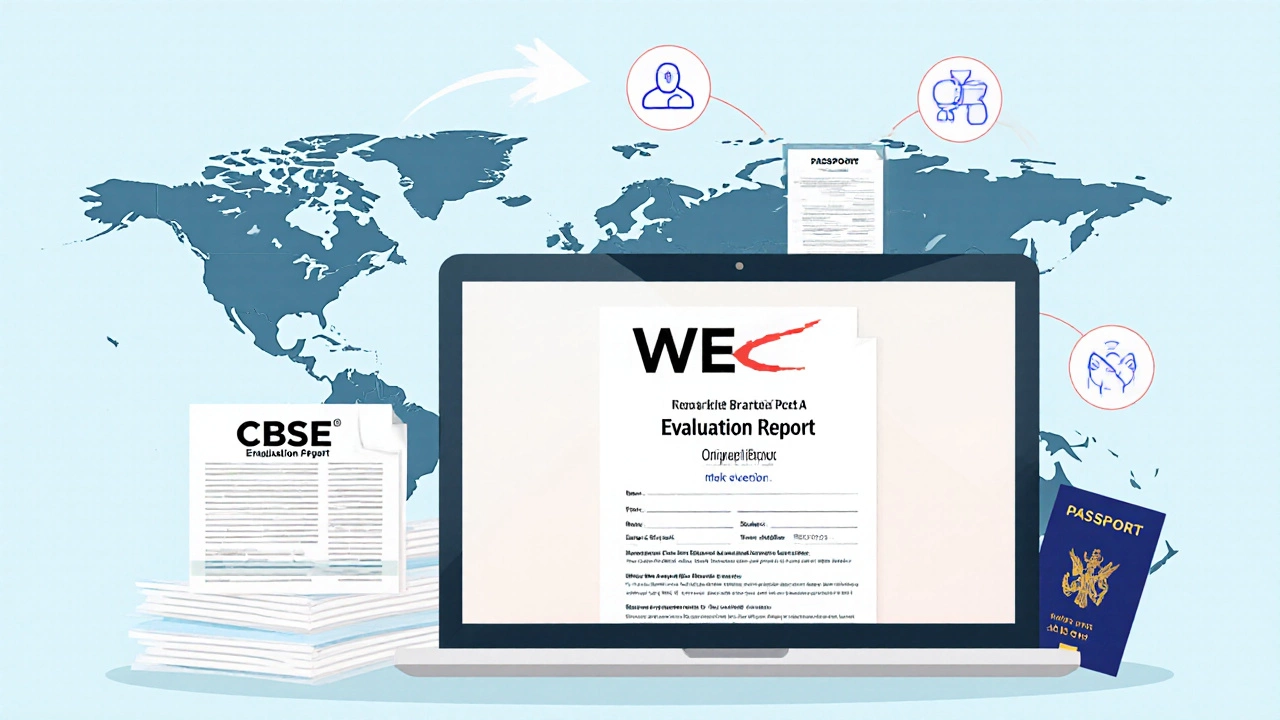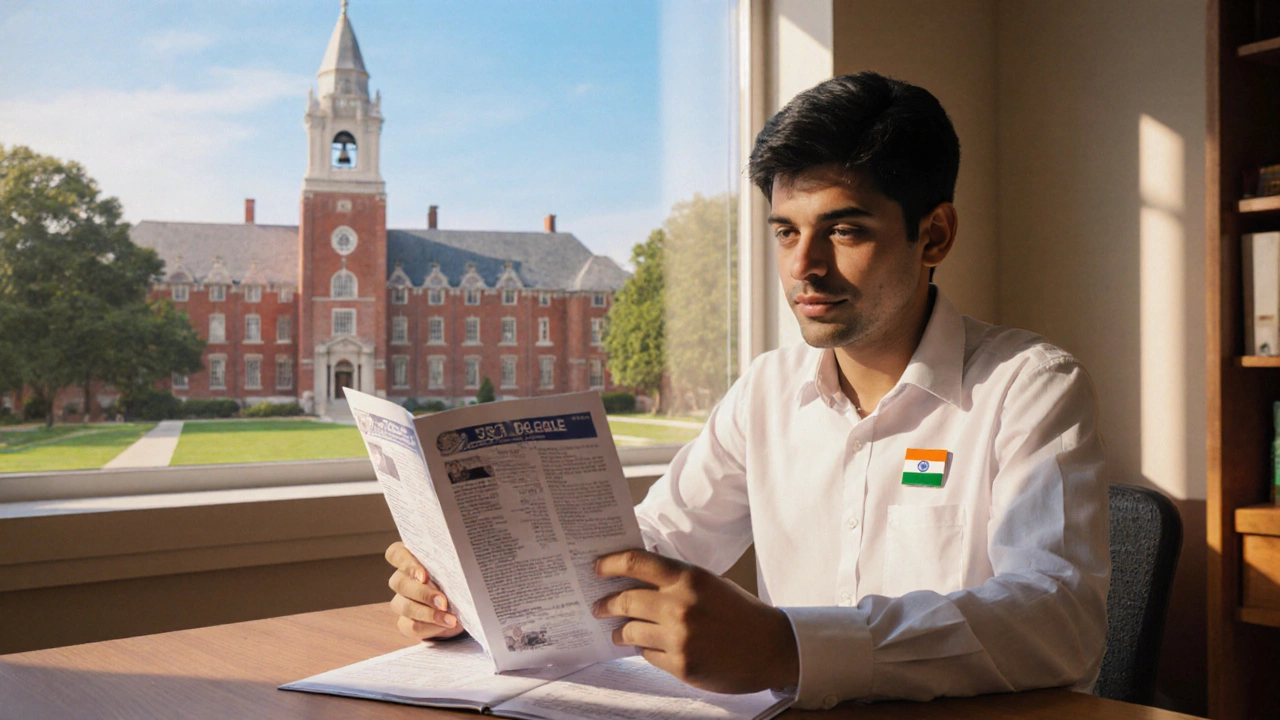CBSE to U.S. GPA Converter
Convert Your CBSE Score to U.S. GPA
Enter your CBSE percentage score to see how it converts to the U.S. GPA scale (4.0).
Wondering if a CBSE (Central Board of Secondary Education) is a national Indian school board that conducts the 10th and 12th grade examinations will open doors to American universities? The short answer: yes, but the path isn’t automatic. U.S. colleges look at the transcript, evaluate it through credential services, and often compare it with familiar curricula like AP or IB. Below is a step‑by‑step guide that shows exactly how the process works, what you need to prepare, and where CBSE stands next to other international programs.
How U.S. Colleges View the CBSE Curriculum
Most American institutions treat CBSE as a rigorous, standardized curriculum comparable to other recognized worldwide systems. Admissions officers focus on three things:
- Official transcripts showing grades and subject combinations.
- Standardized test scores (SAT, ACT, or subject‑specific tests).
- Credential evaluation reports that translate CBSE results into U.S. equivalents.
When your transcript arrives, the U.S. College Admissions processes applications, reviews academic records, and decides eligibility for admission and financial aid will first verify its authenticity. If the school is accredited by the U.S. Department of Education federal agency that oversees public education and recognizes accrediting bodies, the transcript is accepted as valid. CBSE schools are listed in the World Education Services database, making verification smoother.
Credential Evaluation: Turning CBSE Scores into U.S. Grades
Most universities require an evaluation from a recognized service such as World Education Services (WES) the leading credential evaluation agency in North America. Here’s what the evaluation typically covers:
- Conversion of CBSE marks (out of 100) to U.S. GPA scale (4.0).
- Equivalency of subjects - e.g., CBSE Physics maps to a U.S. physics credit.
- Recognition of board’s rigor - WES notes CBSE’s emphasis on analytical skills.
After you submit the CBSE mark sheets, certificates, and a copy of the school’s affiliation letter, the agency usually returns the report within 2-3 weeks. The report is then uploaded to your university portal, where admissions staff can see an exact GPA conversion.
Comparing CBSE with Other International Curricula
American colleges are familiar with Advanced Placement (AP) and International Baccalaureate (IB). Below is a quick comparison that helps you see where CBSE stands.
| Feature | CBSE | AP | IB |
|---|---|---|---|
| Duration | 10‑12 years (full school) | Year‑long courses (optional) | 2‑year Diploma |
| Assessment style | Board exams + internal assessments | Standardized exam at end of course | Internal assessments + final exams |
| College credit | Often granted after evaluation | Direct credit if score ≥4/5 | Credit for higher‑level subjects |
| Recognition in U.S. | Widely accepted, requires evaluation | Universally recognized | Universally recognized |
| Flexibility | Elective streams (Science, Commerce, Arts) | Choose any AP subjects | Core + six subjects across disciplines |
While AP and IB give you direct college credit, CBSE’s strength lies in its comprehensive syllabus and strong emphasis on problem‑solving. The evaluation step adds a small time cost, but most students find it worth the effort.
Step‑by‑Step Guide for CBSE Students Applying to U.S. Colleges
Follow these concrete actions to avoid surprises:
- Gather official documents. Request the original mark sheets, the CBSE passing certificate, and a letter of authenticity from your school’s principal.
- Choose a credential evaluator. WES, ECE, or IER are popular. Register on their portal, pay the fee (≈ $120‑$150), and upload scanned copies.
- Take standardized tests. SAT or ACT scores are essential. A strong Math/Science score complements your CBSE background.
- Recommended: SAT Math ≥700, Evidence‑Based Reading ≥680.
- Prepare your personal statement. Highlight CBSE projects, lab work, and any national competitions (e.g., Olympiads). Admissions love evidence of depth.
- Apply through the Common App or individual portals. Attach the WES evaluation report and SAT scores.
- Track visa requirements. After acceptance, you’ll need an I‑20 form. The CBSE diploma is treated like any high school qualification.
Tip: Start the evaluation process at least three months before application deadlines. Many schools have early‑decision rounds in November.
Common Pitfalls and How to Avoid Them
Even with a solid plan, students often stumble on a few details:
- Skipping the evaluation. Some colleges claim “transcripts suffice,” but most still request an official report.
- Missing the SAT/ACT deadline. CBSE exam results are released in May; give yourself a buffer before test dates.
- Neglecting English proficiency. Even if you scored well in CBSE English, most universities require TOEFL (≥80) or IELTS (≥6.5).
- Assuming automatic credit. Only AP/IB automatically grant credits; CBSE credits depend on the evaluator’s conversion and the college’s policy.
By checking each box early, you keep your application timeline smooth.

Quick Checklist for CBSE Applicants
- Official CBSE certificates (10th & 12th).
- WES or equivalent evaluation report.
- SAT/ACT scores (plus optional SAT Subject Tests).
- TOEFL/IELTS scores.
- Personal statement highlighting CBSE projects.
- Letters of recommendation from CBSE teachers.
- Application deadlines (early decision, regular decision).
Cross‑checking this list before you hit “Submit” can save weeks of back‑and‑forth.
Illustrative Success Stories
Consider Riya, a CBSE student from Mumbai who earned a 1480 SAT score and a 112 in TOEFL. After a WES evaluation gave her a 3.8 GPA equivalent, she secured admission to the University of California, Berkeley for Computer Science. Her key advantage was a CBSE‑based robotics project that earned a national award, which she highlighted in her essay.
Another example is Arjun (not the author), who combined CBSE with AP Chemistry. The dual exposure convinced the admissions committee at MIT that he could handle college‑level labs, leading to a full scholarship.
Where to Find More Help
Several reputable sources can guide you:
- National Center for Education Statistics (NCES) maintains data on foreign credential recognition in the U.S.
- Official CBSE website - it lists schools that already have U.S. evaluation partners.
- College admissions webinars hosted by Accredited US Colleges institutions authorized to confer degrees and accept international credentials.
Reach out early, ask specific questions about CBSE equivalency, and keep copies of every document you submit.
Will U.S. colleges accept CBSE without a credential evaluation?
Most colleges still ask for an official evaluation from agencies like WES. The evaluation confirms that your CBSE marks translate to a U.S. GPA and verifies the board’s accreditation.

How does the CBSE grading scale convert to a 4.0 GPA?
A typical conversion maps 90‑100% to a 4.0, 80‑89% to 3.7‑3.9, 70‑79% to 3.0‑3.6, 60‑69% to 2.0‑2.9, and below 60% to 0‑1.9. Evaluators may adjust based on subject difficulty.
Do I need SAT or ACT if I have a strong CBSE record?
Yes. U.S. colleges use SAT/ACT as a common benchmark. A high CBSE score alone doesn’t replace these tests, though some test‑optional schools may waive them if your GPA is very high.
Can I get college credit for CBSE subjects?
Credit is granted on a case‑by‑case basis. Some universities accept CBSE maths or physics as equivalent to introductory courses after reviewing the evaluation report.
What English proficiency tests are required?
Most schools accept TOEFL (≥80) or IELTS (≥6.5). A high CBSE English score can strengthen your profile but does not replace the test.
How long does the credential evaluation take?
Typically 2‑3 weeks once all documents are uploaded. Faster processing is available for an extra fee.
